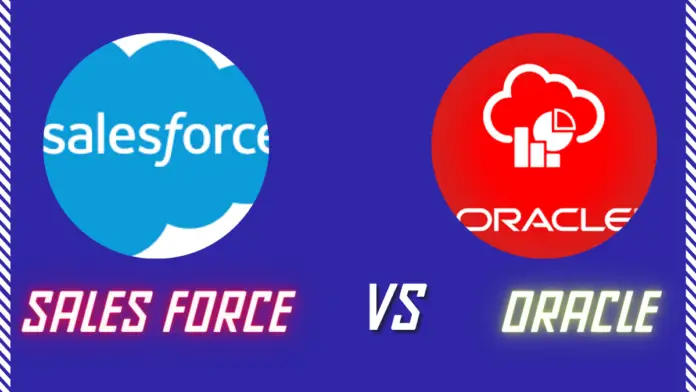Salesforce Apex and Oracle Apex are low-code application development platforms that enable us to develop custom applications without writing much code. They provide various functionality and features; however, there are some critical differences between the two. This Salesforce Apex vs. Oracle Apex blog discusses those platforms on the basis of their different features and services.
What is Salesforce Apex?
Salesforce Apex is an object-oriented programming language developed by Salesforce.com. It enables you to implement the transaction control statements on Force.com.
It allows the developers to insert business logic into most system events, like button clicks, Visualforce pages, and related record updates. It can be commenced by the Web service requests and from the triggers on objects.
Salesforce Apex Features
Important features of Salesforce Apex are as follows:
1) Easy to use Syntax
Apex utilizes Syntax like Java. For instance, loop syntax, variable declaration, and conditional statements.
2) Integrated
Apex has been developed to support DML operations like INSERT, DELETE, AND UPDATE, and the DML exception handling. It supports inline SOSL and SOQL query handling, which returns the group of sObject records.
3) Strongly Typed
Salesforce Apex is a robust programming language. It utilizes direct referral to the schema objects like sObject, and the invalid reference rapidly breaks if it is deleted or wrongly typed.
4) Integration with Data
Apex is data-oriented and developed for executing multiple DML statements, and queries together. It performs numerous transaction statements on a single database.
5) Easy Testing
Apex offers in-built support for creating and executing Unit tests, like test results that specify how much code is included and which parts of code can be effective.
6) Upgrades Automatically
Apex can be upgraded as a feature in Salesforce releases. We don’t have to upgrade it separately.
Salesforce Apex Advantages
1) Multitenancy
Salesforce Apex functions in a multitenant environment, an ability where one instance of code can assist multiple tenants from the server. It allows the provider to make modifications once and share them with every tenant.
2) Continuous Access to the Salesforce Backend
Salesforce Apex allows us to personalize and enhance the complete functionality of your processes and applications by utilizing the abilities of Salesforce Backend.
3) Extensive in-built support
Salesforce Apex possesses the advantages of the Salesforce environment, which is popular for providing several support features. Salesforce Apex has various features and built-in support features that help inexperienced users to develop and debug the Apex code easily.
4) Secured
Salesforce is popular for the robust security levels it sustains for its environment. Apex acquires a secure shield from the platform and assures sufficient security for the applications you build.
5) Continuous Updates with Triggers
Triggers are Crucial to sustain the platform functionality. In Salesforce Apex, we use triggers to carry out insert, delete, and update operations or limit the operations if a particular condition is matched.
What is Oracle Apex?
Oracle Apex is the most famous business low-code application platform that allows us to develop secure and scalable mobile and web apps with the best features that can be deployed anywhere – cloud or on-site.
Features of Oracle Apex
1) Responsive Design
It provides various responsive design themes and templates that make applications appear great on every device.
2) Low-Code Development
It designs applications through the low-code method that reduces coding and time efforts.
3) Security
It offers in-built authentication, authorization, encryption, and more features for security.
4) Collaboration Tools
It has various tools for the collaboration of the development team, like team development and version control.
5) Reporting and Analytics
It provides in-built analytics and reporting features for creating graphs and charts to visualize the data and gain insights into the performance.
6) Drag and Drop Interface
It offers a drag-and-drop interface for creating application components like forms, pages, and reports.
7) Oracle Database Integration
It is developed for working with Oracle databases. Thus, integration with them gives a robust database for the applications.
Advantages of Oracle Apex
1) It is easy to use and offers in-depth documentation that is easy to learn and use.
2) It decreases application development time.
3) It provides a lot of personalizable themes.
4) It is freely accessible with the Oracle Database, which reduces your enterprise’s cost.
5) It offers several responsive design themes and templates.
Salesforce Apex and Oracle Apex
1) Features
One of the primary differences between Salesforce Apex and Oracle Apex is how they manage data. Oracle Apex is the server-side platform, which indicates that the data is stored in the Oracle Database. In Contrast, Salesforce Apex is the client-side platform, which indicates that data is stored in the Salesforce cloud.
The difference in architecture can impact scalability, security, and performance. Another critical difference between them is the handling of the UI(user interface) development.
Oracle Apex utilizes a drag-and-drop UI builder, which eases the creation of difficult user interfaces without coding. At the same time, Salesforce Apex uses a conventional coding approach. This indicates that developers will have control of the UI.
2) Pricing
Oracle Apex is free for up to 200 users. After 200 users, a per-user licensing fee is applicable. Salesforce Apex is also free for up to ten users. After ten users, the licensing fee is there.
3) Community
Both Salesforce Apex and Oracle Apex have communities of developers and users. The Oracle Apex community surpasses the Salesforce Apex community. However, the Salesforce Apex community is expanding rapidly.
4) Deployment
We can deploy Oracle Apex applications in many environments, like on-site, cloud, or hybrid environments. Salesforce Apex applications can only be deployed on the Salesforce Cloud. Oracle Apex always needs the Oracle Database Since it runs inside the database.
5) Support
Both Oracle Apex and Salesforce Apex provide extensive document support and training. But, Oracle Apex has a great active community of developers and users, which indicates that you have more support if you require it.
6) Security
Salesforce Apex and Oracle Apex are highly secured platforms. But, due to its long deployment history, Oracle Apex is considered more secure by security experts.
7) Integration
Salesforce Apex and Oracle Apex can integrate with various third-party services and applications. But Salesforce Apex has huge innovative integrations, which can save your efforts and time.
8) Pre-requisites
To learn Oracle Apex, you definitely require PL/SQL scripts for implementing difficult business and validation rules. You need a bit of knowledge of Javascript to learn Salesforce Apex through Salesforce training in Hyderabad.
Conclusion
Oracle Apex is an application development platform that allows us to develop web and mobile apps without coding. Salesforce Apex was developed to implement transactions and perform DDL and DML operations. This Oracle Apex vs. Salesforce Apex will explore every aspect of these two technologies to help you understand the pros and cons of Salesforce Apex and Oracle Apex.
Suneel Ponnamudi
Suneel, a Technology Architect with a decade of experience in various tech verticals like BPM, BAM, RPA, cybersecurity, cloud computing, cloud integration, software development, MERN Stack, and containerization (Kubernetes) apps, is dedicated to simplifying complex IT concepts in his articles with examples. Suneel's writing offers clear and engaging insights, making IT accessible to every tech enthusiast and career aspirant. His passion for technology and writing guides you with the latest innovations and technologies in his expertise. You can reach Suneel onLinkedIn.

















































